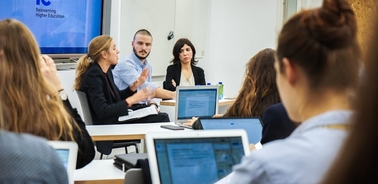- Home
- Policy Challenges In A Global Climate Emergency Context: A Debate On Environmental Displacement
Policy Challenges in a Global Climate Emergency Context: A Debate on Environmental Displacement

IE Students took part on Wednesday in a vivid debate about environmentally displaced people, coinciding with the celebration of the Climate Summit in Madrid (COP25).
The panel discussion organized by IE School of Global and Public Affairs and IE Arts and IE Humanities Division included Nuria Díaz, Advocacy and Social participation coordinator at CEAR (Spanish Commission for Refugees), and Olivia Hamill, Deputy Director of Advisory at Oxford Analytica. The session was moderated by Waleed Abi Nada, IE Student of Law and Business Administration, who has gained global recognition as a supporter of youth in underprivileged communities. Waleed is also the founder of the social enterprise The Champ Camp, where he is actively working to empower young boys and girls in Jordan´s Al-Baqa´s Refugee camp at an athletic, social and educational level through Olympic Weightlifting.
Nuria Díaz opened the debate by underlining the differences between forced displaced people (asylum seekers, refugees and internal displaced people) and voluntary displaced people. She highlighted that there is neither terminology nor legal framework available to govern environmentally displaced people: those who are impelled or induced to migrate because their livelihoods are rendered unsustainable by proliferating natural disasters or the irreversible degradation of environmental resources resulting from the slow-onset impacts of rising sea levels and desertification.
“The international community has a big challenge because there are more and more people who have to leave their homes because of environmental factors”.
Díaz explained that the Geneva Convention on Refugees is the only legal framework for migrants and it cannot apply to climate refugees. She stressed that “the international community has a big challenge because there are more and more people who have to leave their homes because of environmental factors and there is a gap in terms of protection because the Geneva Convention is not protecting them”.
“Neither climate refugees, nor environmental migrants and environmentally displaced people exist, although we read it all the time on the media”, added Olivia Hamill. “There are forced displaced people because of environmental reasons”, she said in front of a completely full room.
Hamill considered that this issue brings the challenge of redefining displacement today because environmental disasters are exacerbating existing migration problems. She warned that the total global refugee population is now at the highest level ever recorded, 25.9 million at the end of 2018, “but possibly hundreds of thousands do not fall in the refugee category”. This is a call to action, she said.
The potential scale of displacement and permanent resettlement related to climate change is estimated at between 50 and 200 million people by 2050, mostly in developing countries.
Both experts discussed with the students the initiatives that have already been taken at the regional and national level to find a solution to the situation and considered that it´s time to try to bring them to an international debate. The current context is different from that of the Geneva Convention and international law needs to be adapted, they concluded.
IE University is a supporting partner of the UN Climate Change Conference in Madrid and will be further supporting the COP25 through its Sustainable Mindset event, taking place on the Madrid campus through December 11th.